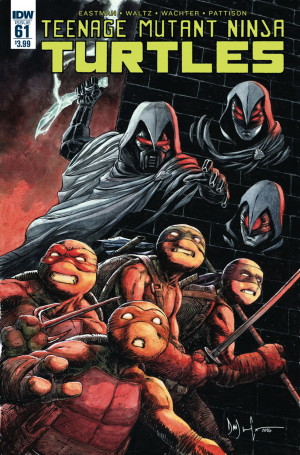Review: Teenage Mutant Ninja Turtles #61
I write comic reviews because I personally find it fun. I analyze stories and comics and movies in my spare time anyway and honestly, the people around me are sick of hearing it. Funneling this into written reviews is good, and I honestly look forward to it. So why did I have to drag my way through TMNT #61? I even have fun analyzing bad fiction, as the unique things that can make a story bad can be at least interesting to talk about, but I read Turtles #61 two days before starting this review, I didn’t like it then, and it’s only settled on my memory worse as the hours passed by. Don’t tell my editor it took me two days to get here. I mean it didn’t. I only got to it now. Because of time stress. Obviously. Don’t fire me.
 I had to drag my way through #61 because it’s the worst kind of continuation issue: a boring, overly-wordy re-establishment of the status quo. They’re neither interesting to read nor are they interesting to talk about. The act of reading Turtles #61 reminds me of how it must feel to be the parent of a young child or my girlfriend, being told useless facts about comic minutia ad nauseum with none of the excitement of actually experiencing the work itself.
I had to drag my way through #61 because it’s the worst kind of continuation issue: a boring, overly-wordy re-establishment of the status quo. They’re neither interesting to read nor are they interesting to talk about. The act of reading Turtles #61 reminds me of how it must feel to be the parent of a young child or my girlfriend, being told useless facts about comic minutia ad nauseum with none of the excitement of actually experiencing the work itself.
I’ve been put on record saying that comics are often better when they allow their "in-between" issues to stretch their legs and allow for the comic as a whole to feel more cohesive and well thought out, rather than panicking to make each and every issue an exciting series of climactic events in order to justify its entry fee.
The problem is, however, that this theoretical leg stretching should exist at the service of the plot, in order to give room to the individual moments that are important for feel or atmosphere. There’s not a person on Earth who genuinely wants the famous knight in the archetypal "saving the princess" story to skip over the journey to the dragon’s lair just so we can see the big fight with the dragon. Atmosphere is important. However, one of the most difficult tasks for any writer is to balance the acts of exposition and atmosphere because the two concepts are almost completely incompatible.
So answer me this: when an issue has exactly _ continuity points that it needs to exposit before moving on to bigger events, there’s a new gang in town, Alopex is missing, the world is becoming more dangerous, and Mikey is unhappy with how events are unfolding; why on Earth would you spend this much time expositing these things through dialogue? Michelangelo himself comments that the meeting that takes up the vast majority of the issue feels like ‘a stupid war counsel’ and I couldn’t help but agree. The "planning" scene of any war movie is usually very short for the same reason that heist movies usually overlay the monologue of the heist planning over the heist’s execution. Explaining a series of events that is going to come to pass so that you can be informed about them again as they’re happening is very, very boring.
What small bits of character development and recuperation from previous events we receive feels token and unnecessary. The Purple Dragon characters are as boring as they’ve ever been, much like the ancestral God characters, dragging the story and events down with them with their somber, dire attitudes. Master Splinter takes entirely too long to explain to Casey Jones the extremely simple concept of ‘you are going to be very important in coming events.' It’s a complete wash of an issue and the very definition of filler. The ending cliffhanger, the new gang kidnaps a new character who could be dangerous in some vague way, was completely token and served not even to excite readers into buying the next issue, but to in some way resemble other comics that are trying to do that.
There’s a new gang of techno-thugs. Michelangelo’s unhappy. Life is hard. You’re now completely ready for issue #62. Skip this one.
[su_box title="Score: 1/5" style="glass" box_color="#8955ab" radius="6"]
Teenage Mutant Ninja Turtles #61 Writer: Tom Waltz Artist: David Wachter Colorist: Ronda Pattison Publisher: IDW Publishing Price: $3.99 Format: Ongoing; Print/Digital
[/su_box]
